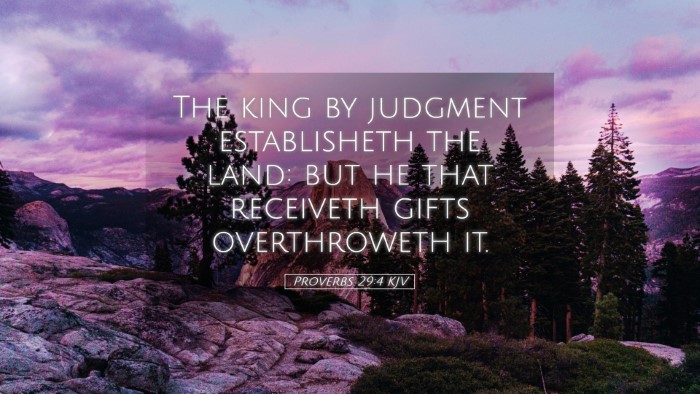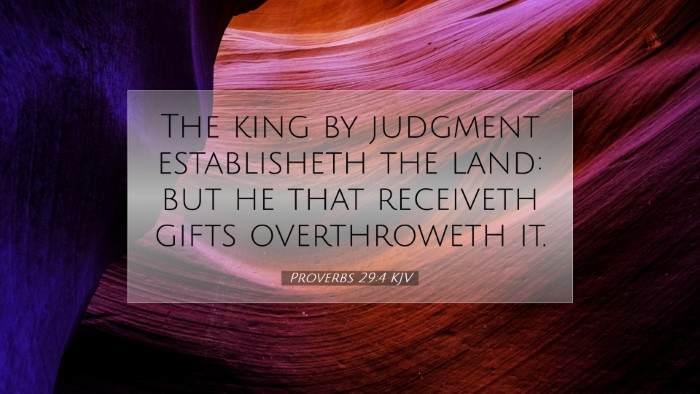Commentary on Proverbs 29:4
Proverbs 29:4: "The king by judgment establisheth the land: but he that receiveth gifts overthroweth it."
This verse presents a profound exploration of leadership, justice, and moral integrity. The juxtaposition between the righteous establishment of a kingdom and the destructive influence of corruption through bribery is evident.
Contextual Setting
The Book of Proverbs is renowned for its practical wisdom, often decorated with pithy sayings that apply to everyday life. Chapter 29 brings forth themes pertinent to governance, justice, and the role of authority. As we delve into this verse, we appreciate its implications for rulers and citizens alike.
Matthew Henry's Insights
Matthew Henry expounds on the idea that wise rule contributes directly to the stability and flourishing of a nation.
- Establishment By Judgment: A ruler who seeks justice and makes wise decisions fosters a strong foundation for the land. His judgments, grounded in righteousness, lead to prosperity.
- Danger of Bribery: In contrast, Henry underscores the perilous nature of corruption. The individual who is swayed by gifts or bribes undermines the social order, leading to chaos and moral decay.
- Moral Leadership: Leaders are reminded of their divine calling to uphold righteousness. The king's role is not merely to rule but to be an agent of justice, reflecting God's statutes in the realm.
Albert Barnes' Commentary
Albert Barnes brings additional layers of understanding regarding the king's authority and the societal ramifications of his actions.
- Judgment and Equity: Barnes highlights that a ruler's administration based on justice inspires trust and security among the people. It is integral that leaders administer their duties with fairness.
- Consequences of Gifts: The notion of 'gifts' or 'bribes' points to the moral hazards facing leaders. Barnes warns that such practices not only compromise individual integrity but can escalate into systemic corruption, leading to societal downfall.
- Justice as Foundation: He further asserts that a kingdom's prosperity hinges on the integrity of its leaders. True stability derives from the wise application of justice and a commitment to moral principles.
Adam Clarke's Analysis
Adam Clarke provides a more nuanced interpretation, recognizing the biblical insight into human behavior and governance.
- Leadership and Accountability: Clarke posits that leaders are held to a higher standard, and their failure to uphold justice results in both personal and collective accountability.
- The Nature of Gifts: He also interprets 'gifts' more broadly as any form of undue influence. Clarke warns that these influences, whether monetary or political, can lead to injustice and exploitation.
- The Role of the King: The king's role is to guide the people towards righteousness. The verse offers a stark reminder that alignment with divine justice leads to a flourishing community.
Theological Reflections
From the combined insights of these commentaries, several theological reflections arise that hold significance for pastors, students, theologians, and scholars:
- The Divine Standard: Governance must align with God’s character, which emphasizes justice, equity, and righteousness.
- Impact of Corruption: A warning against the pervasive nature of corruption, reminding leaders to remain vigilant against temptations that undermine their roles.
- Responsibility of Leaders: Emphasizing the responsibility of leaders to serve as instruments of justice, reflecting a commitment to Godly principles.
- Call for Integrity: A call for integrity amongst all members of society, urging citizens to hold leaders accountable.
Practical Applications
The insights gleaned from Proverbs 29:4 invite practical applications:
- Encouraging Righteous Leadership: Teaching and encouraging current and future leaders to prioritize justice and righteousness in their leadership roles.
- Building Accountability Structures: Establishing systems that hold leaders accountable for their actions and decisions, deterring corrupt practices.
- Promoting Integrity: Fostering a culture of integrity among both leaders and the public, valuing ethical decision-making.
- Engagement in Governance: Encouraging congregations to engage with local and state governance, advocating for justice and fair leadership.
Conclusion
Proverbs 29:4 serves as a poignant reminder of the profound relationship between leadership, justice, and societal well-being. In drawing from the rich commentary tradition of Matthew Henry, Albert Barnes, and Adam Clarke, we can grasp the depth of wisdom contained in this verse and its implications for all of us as we navigate the complexities of moral leadership in today's world.


